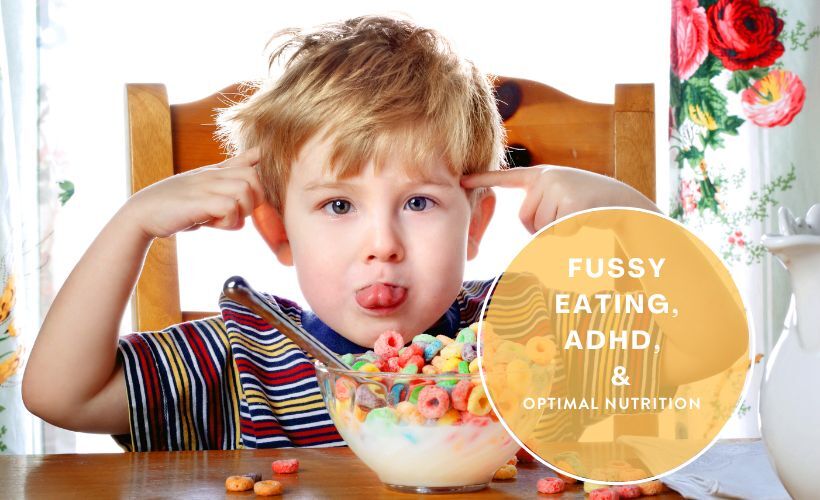
Attention Deficit Hyperactivity Disorder (ADHD) is a complex neurodevelopmental condition that affects both children and adults, characterised by symptoms of inattention, hyperactivity, and impulsivity. While the exact causes of ADHD remain unclear, research suggests that genetics, environmental factors, and nutrition all play significant roles. As a dietitian-nutritionist, I often encounter parents seeking advice on managing their child’s ADHD symptoms through diet, yet we are mostly working with extreme fussy eaters, so it is complicated! This blog post explores the connection between fussy eating, ADHD and nutrition, highlighting key findings from recent studies and offering practical insights for parents.
Fussy Eating and ADHD
Children with ADHD often exhibit fussy eating behaviours, which can exacerbate nutritional deficiencies and further impact their symptoms. These extreme fussy eaters may show:
-
Sensory Hypersensitivities: Many children with ADHD experience heightened sensitivity to the taste, texture, smell, or appearance of food. As a result, they may reject certain foods or prefer only a limited range of textures and flavours. A study published in PubMed found that children with neurodevelopmental disorders, including ADHD, accepted fewer food items and were more likely to consume “unhealthy foods” than their peers (PubMed, 2021).
-
Impulsivity and Inattention at Mealtimes: ADHD affects a child’s ability to focus and sit still, making structured mealtimes challenging. Many children with ADHD prefer quick, highly palatable foods that require minimal effort to chew or eat. This preference can lead to an over-reliance on processed foods and a lack of balanced nutrition. A study from Duke University highlights the strong correlation between ADHD and selective eating, showing that children with ADHD are significantly more likely to be classified as picky eaters (ADDitude Magazine).
Understanding ADHD and Nutrition
ADHD is believed to be influenced by low levels of certain neurotransmitters in the brain, such as dopamine and noradrenaline, which are crucial for self-regulation. Nutrition can impact the production and function of these neurotransmitters, thereby influencing ADHD symptoms. Studies have shown that dietary changes and nutritional supplements can help manage these symptoms, although the evidence is not yet conclusive9.
The Role of Diet in ADHD
-
Nutrient Deficiencies: Inadequate intake of essential nutrients can affect brain development and function, worsening ADHD symptoms.
-
Behavioural Issues: Poor nutrition can lead to increased irritability, impulsivity, and hyperactivity, creating a cycle that reinforces fussy eating habits.
Understanding Elimination Diets
Parents often ask me about elimination diets. This is not something I generally encourage because many of the children already eat small amounts, sometimes due to medication they take. However, I believe it is a good idea to mention them here, so parents may further look into them and find professional guidance to support them in their endeavours, if that’s what they wish to explore.
Elimination diets involve temporarily removing certain foods or ingredients from a child’s diet to identify potential triggers that may exacerbate ADHD symptoms. The most commonly explored elimination diets include:
-
Feingold Diet: Pioneered by Dr. Feingold, this diet eliminates salicylates, artificial food colours, and preservatives. While initial claims suggested improvements in behaviour, reviews have been inconclusive. However, this diet sparked further research into the effects of food additives on ADHD9.
-
Few Foods Elimination Diet: This diet involves restricting to low-allergen foods and then reintroducing potential triggers. Studies have shown significant improvements in ADHD symptoms for many children, with common triggers being cow’s milk and wheat9. Let me say it again, if your child is an extreme fussy eater, removing those foods may leave you without much to work with.
Now, I am in favour of adding rather than removing, so here we go:
Supplements and ADHD
-
Omega-3 Fatty Acids: Children with ADHD often have lower levels of omega-3 fatty acids, which are essential for brain function. Supplementing with omega-3s has been shown to improve task completion, reduce aggression, and decrease hyperactivity9.
-
Vitamins and Minerals: Deficiencies in iron, zinc, and magnesium are common in children with ADHD. Supplementing with these nutrients has shown promise in improving symptoms, although more research is needed9. On the other hand, iron deficiencies may increase ADHD symptoms.
The Role of Probiotics, Live-Culture Rich Foods, and Prebiotics
In addition to the dietary strategies mentioned earlier, there is growing interest in the role of gut health in managing ADHD symptoms. Probiotics, live-culture rich foods, and prebiotics have emerged as potential interventions due to their influence on the gut microbiome, which can impact brain function and behaviour.
-
Probiotics and ADHD: Probiotics are live microorganisms that, when consumed in adequate amounts, confer health benefits. They can help maintain a healthy gut microbiome, which is crucial for overall health and brain function. Emerging research suggests that probiotics may play a role in managing ADHD symptoms by improving gut-brain axis communication and reducing inflammation.Studies have shown that probiotic supplementation, particularly with strains like Lactobacillus and Bifidobacterium, can improve ADHD symptoms such as hyperactivity and impulsivity, and enhance cognitive performance. A double-blind randomised controlled trial found that college students with ADHD who took a multi-strain probiotic supplement for three months experienced reduced symptoms. Additionally, a systematic review indicated that probiotics could improve emotional, physical, social, and school functioning in children with ADHD. These findings highlight the potential of probiotics as an adjunctive treatment for ADHD, although further research is needed to determine the most effective strains and long-term benefits10,12,13,14,11.
-
Live-Culture Rich Foods: Foods like yogurt, kefir, sauerkraut, and kimchi are natural sources of probiotics ( you will need to identify live-culture labels when buying those foods). Incorporating them into a child’s diet can help support a healthy gut microbiome and potentially improve ADHD symptoms.
-
Prebiotics and ADHD: Prebiotics are non-digestible fibres that feed the beneficial bacteria in the gut. They can be found in foods like bananas, onions, garlic, and whole grains. Prebiotics work synergistically with probiotics to support a healthy gut microbiome, enhancing the positive effects of probiotics on ADHD symptoms.
Diet Quality and ADHD
-
Western Diet vs. Whole Foods: A diet high in processed foods, sugars, and unhealthy fats has been linked to a higher risk of ADHD. Conversely, a diet rich in whole foods, such as fruits, vegetables, and lean proteins, supports better emotional health and may help manage ADHD symptoms7.
Practical Tips for Parents
-
Encourage a Balanced Diet: Ensure your child consumes a variety of nutrient-rich foods, including fruits, vegetables, lean proteins, and whole grains.
-
Consider Supplements: Discuss with your healthcare provider the potential benefits of supplementing with omega-3 fatty acids, iron, zinc, or magnesium.
-
Incorporate Probiotic Foods: Add yogurt, kefir, sauerkraut, or kimchi to your child’s diet to naturally introduce probiotics.
-
Include Prebiotic-Rich Foods: Ensure your child consumes foods rich in prebiotics, such as bananas, onions, garlic, and whole grains.
-
Monitor Dietary Triggers: Keep a food diary to identify potential dietary triggers and consider an elimination diet under medical supervision.
-
Promote Healthy Eating Habits: Make meal times enjoyable and stress-free to encourage better eating habits.
While nutrition is not a cure for ADHD, it plays a crucial role in managing symptoms. By understanding the link between diet and ADHD, parents can make informed decisions to support their child’s overall health and well-being. Always consult with a healthcare provider before making significant dietary changes or starting new supplements.
For further reading, explore the studies and reviews that delve deeper into the relationship between nutrition and ADHD9.


